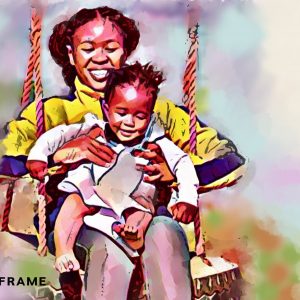Sibongile Mani is a scapegoat, says student movement
The student who spent NSFAS money paid erroneously into her account faces five years in prison, but her supporters say the company responsible for the error is making an example of her.
Author:
30 March 2022

Sibongile Mani, the Eastern Cape student who was convicted of theft in February, after spending R818 000 of the R14 million accidentally deposited into her bank account, has been sentenced to five years in prison.
Intellimali, a private company that some universities use to process their National Student Financial Aid Scheme (NSFAS) payments, transferred the money to student Mani in 2017 instead of her monthly NSFAS allowance of R1 400. Intellimali only blocked her account more than two months later, after she had spent some of the funds. Mani is a 31-year-old, single mother of two children aged 10 and 13.
Two pre-sentencing reports by the Department of Social Development and the Department of Correctional Services recommended a suspended sentence, saying Mani “bought vouchers for other students who didn’t have NSFAS, also from a poor background. She sent her mother vouchers to buy food. She bought a lounge suite and bed at home and bought her children learning material”.
But magistrate Twanet Olivier ignored the reports. “This court is of the view that a suspended sentence is inappropriate, totally. The only form of sentence this court deems appropriate is direct imprisonment.” She likened Mani to a “white-collar criminal”, saying it was well known that this “type of offence is tightening its grip in South Africa and threatens the stability and wellbeing of its people”.
Related article:
Mani’s attorney Asanda Pakade told the court previously that on the day the R14 million was mistakenly transferred to Mani’s bank account, she was “sitting with an empty stomach. At the time the credit was transferred she could not even afford to buy a quarter of a loaf of brown bread.” But Olivier rejected this. “I was told that on the morning of the first [of the month], when your food allowance should have been paid in, you were hungry. That should have been remedied because you would have received your food allowance [later that day].”
The magistrate said Mani was not “a victim” because of her impoverished background, as she was “the recipient of all of these benefits” at the time, referring to the NSFAS food and accommodation allowances.
Mani has a degree in accounting, a diploma in internal auditing, a post-graduate certificate in education and is studying towards an honours degree in education.
Payment errors
Mani and her supporters burst into tears after hearing her sentence, then huddled together to pray. About 100 members of the Pan Africanist Student Movement of Azania (Pasma), to which Mani belongs, have supported her at each court appearance.
Pasma’s national secretary-general Zandisiwe Nyimbana called for an investigation into Intellimali’s competence.
Pakade said he would apply for leave to appeal the conviction and sentence, which will be heard on 11 April. Mani will remain out of prison on bail.
Related article:
Before the sentence was passed, Pakade told the court that Mani’s grandmother raised her along with her siblings and cousins, and that the family survived on one old-age grant. She was the first to attend university.
“She has emerged from a very poor background. After passing matric she could not proceed straight to university because there were no funds. She got a job, took care of her family, she made little savings to get to university and she managed to do just that,” said Pakade.
Law flaw
Mani has become a symbol of unequal treatment before the law, with student organisations and social movements saying many young people receiving such a windfall would spend at least some of the money and Mani should not be punished for this.
They have highlighted the stark difference between Mani’s conviction and the politicians and government officials who have still not been charged or tried over allegations that they stole tens of millions of rands of state funds during the state capture period and the Covid-19 personal protective equipment (PPE) corruption scandal.
Shack dwellers’ movement Abahlali baseMjondolo said it was unfair that only Mani’s purchases of cigarettes and alcohol have been highlighted when she also bought cellphone airtime, blankets, cookware, cutlery, extension cords, clothing, kettles, underwear and microwaves.
Related article:
“It was not mentioned that she also bought basic needs. She was sentenced for the incompetency of the government. This is the story of the poor Black student in our country,” said Abahlali baseMjondolo general secretary Thapelo Mohapi.
The Independent Komani Residents’ Association (iKora) said that in transferring millions of rands to Mani’s bank account, Intellimali had “exploited her vulnerability as a student from a disadvantaged background”.
“There are many corruption cases which remain unresolved because the judiciary is dragging its feet,” said iKora secretary general Thulani Bukani. “Why is the same agility not employed when dealing with the elites?”
Good for the goose…
Ayanda Kota, a leader in Makhanda’s Unemployed People’s Movement and the Makana Citizens’ Front has questioned why Mani was charged and convicted when former health minister Zweli Mkhize has yet to be brought before the courts on charges of money laundering during the Covid-19 pandemic.
“The politicians steal from the poor and get away with it. Even during the most difficult life-threatening moments, they were switching life-support machines off by stealing monies that were budgeted for PPE to save the lives of the millions of working-class people during the Covid-19 pandemic,” said Kota.
Related article:
Socialist Youth Movement campaign coordinator Zaki Mamdoo said Mani’s case “highlighted the urgent need for free, quality, decolonised education for all”. The state “created the beast of student debt, hunger and youth unemployment, and cannot be shocked when people reach for remedies that appear in their bank accounts as if by miracle,” he added.
Intellimali has not explained how it paid Mani R14 million instead of R1 400, maintaining that it was an unexplainable glitch.




